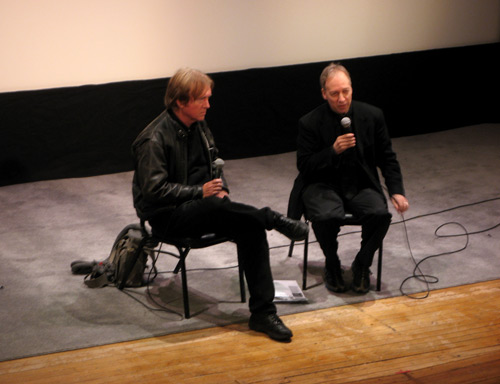The Duchess of Langeais
My Town Hall Feature Film Seminar Series began in earnest this week. For the next three months, I’ll be in Times Square every other Monday night — a frequency which I used to describe as “bi-weekly.” Until rather recently, I thought that “bi-weekly” was synonymous with “fortnightly” — which it is — but Merriam-Webster lists a primary definition of “occurring twice a week.” So yes, the two definitions vary by a factor of four, and technically, “bi-weekly” could mean the same as “bi-monthly.” Gee, you think this ever causes any confusion?
Tonight’s film was Jacques Rivette‘s The Duchess of Langeais (Ne Touchez pas la Hache) — an adaptation of Honoré de Balzac’s novella, La Duchesse de Langeais. (The English title of the French film keeps the author’s original title, while the French “Don’t Touch the Axe” is culled from an ominous anecdote in the film.) The much-admired Antoinette de Langeais (chanteuse/actrice Jeanne Balibar), a married aristocrat with an oft-absent husband, is bored by her lavish, but empty Restoration-era Parisian lifestyle. She meets a Napoleonic war hero, the dashing General Armand de Montriveau (Guillaume Depardieu — yes, son of Gérard) — and the two begin an intense, but unconsummated flirtation, during which the duchess tantalizingly retains the upper hand to the endless frustration of de Montriveau – an imposing man clearly used to getting his way. Eventually, however, both control and power shift to de Montriveau and the story evolves into a tale of obsessive passion between two ill-starred, stubbornly unyielding — and thus frustrated – partners plunged into the alienating, often degrading, depths of love.

Afterwards, we sat through one of our more erudite post-film discussions, featuring guest Godfrey Cheshire (left), the director and New York-based film critic. I learned more in this single night about Rivette and the Nouvelle Vague (the French cinema movement, that is, not the musical collective) than in all my years of watching movies. Then again, the man behind such films as Céline and Julie Go Boating, Va Savoir and La Belle Noiseuse is generally considered the most experimental, and therefore the least screened, of his renowned colleagues Jean-Luc Godard, Éric Rohmer, and François Truffaut. It may have something to do with Rivette’s deliberately challenging films and penchant for length; one of the director’s earlier masterpieces, Out 1, is another Balzac adaptation that infamously stretches well over twelve hours long — 743 minutes, to be precise. That’s almost 9 Cloverfields! Sacrebleu!
There are no comments just yet.
Go for it ...
Search
Popular Tags
Categories
Archive
- July 2010
- July 2009
- January 2009
- November 2008
- September 2008
- August 2008
- July 2008
- June 2008
- May 2008
- April 2008
- March 2008
- February 2008
- January 2008
- December 2007
- November 2007
- October 2007
- September 2007
- August 2007
- July 2007
- June 2007
- May 2007
- April 2007
- March 2007
- February 2007
- January 2007
- December 2006
- November 2006
- October 2006
- September 2006
- August 2006
- July 2006
- June 2006